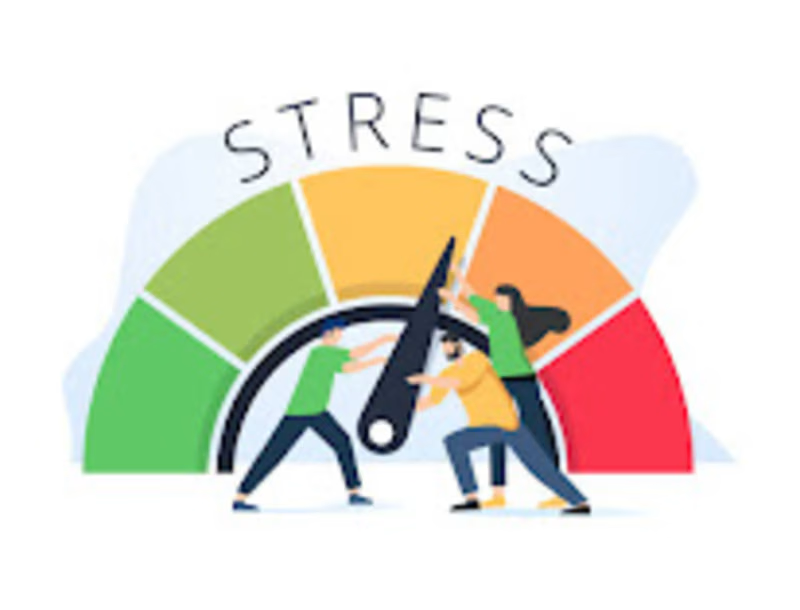Title:
The Impact of Exams on Mental Health: Understanding the Hidden Struggle

Introduction :
In modern education systems, exams play a pivotal role in evaluating students' academic progress and determining their future prospects. While examinations are intended to be a fair assessment of knowledge and skills, they often bring with them an unforeseen consequence: a surge in mental health challenges, particularly depression. This blog delves into the multifaceted impact of exams on students' mental well-being, exploring the underlying causes, the pressures students face, and potential solutions to mitigate the negative effects.
The Pressure Cooker: Unraveling the Exam-Depression Connection:

Exams are undeniably high-stress events for students. The pressure to perform well, fear of failure, and the desire to meet societal expectations create a toxic concoction of stress and anxiety. This pressure cooker environment can lead to a myriad of emotional responses, ranging from mild nervousness to debilitating depression.
1. Unrealistic Expectations: Societal emphasis on academic achievement places unrealistic expectations on students to excel in exams, leading them to feel overwhelmed and inadequate when they fall short of these lofty standards.
2. Identity and Self-Worth: Students may internalize exam results as a reflection of their intelligence and worth as individuals. Poor performance can severely dent their self-esteem, leading them to develop a negative self-image.
3. Limited Scope for Holistic Development: The overemphasis on exams can shift the focus away from holistic learning and personal growth, promoting a culture of rote memorization instead of fostering critical thinking and creativity.
4. Time Pressure and Burnout: Exam periods are characterized by intense time pressure, causing students to cram vast syllabi within limited time frames, leading to burnout and mental exhaustion.
5. Constant Comparison: The grading system fosters a culture of comparison among students, fueling unhealthy competition and causing emotional distress for those who feel they cannot keep up.
The Impact on Mental Health:
Addressing the Consequences

The correlation between exams and depression cannot be underestimated. The toll they take on students' mental health can manifest in various ways:
1. Anxiety Disorders: The stress and fear of exams can lead to anxiety disorders, such as generalized anxiety, panic attacks, and test anxiety, which can severely disrupt students' ability to perform.
2. Sleep Disturbances: The heightened stress levels can cause sleep disturbances, leading to sleep deprivation and exacerbating mental health problems.
3. Withdrawal and Isolation: Some students may withdraw from social interactions, feeling overwhelmed and inadequate, leading to feelings of loneliness and isolation.
4. Loss of Interest: Continuous pressure from exams may cause students to lose interest in studies and other activities they once enjoyed.
5. Suicidal Ideation: In severe cases, exam-related depression can escalate to suicidal thoughts and actions, making it a critical concern for educators and parents.
Breaking the Stigma:
Encouraging Open Dialogue
Addressing the issue of exam-related depression requires a concerted effort from all stakeholders involved in the education system. Here are some steps that can help alleviate the problem:
1. Mental Health Education: Incorporate mental health education into the curriculum to raise awareness and reduce the stigma surrounding mental health issues.
2. Support Systems: Establish support systems within educational institutions, such as counseling services and peer support groups, to assist students facing emotional challenges during exam times.
3. Holistic Evaluation: Advocate for a more holistic evaluation system that considers various aspects of a student's abilities and potential, rather than relying solely on exams.
4. Mindfulness and Stress Management: Introduce mindfulness practices and stress management techniques in the curriculum to equip students with coping mechanisms.
Conclusion:
While exams are an integral part of the education system, their potential to trigger depression and anxiety cannot be overlooked. To create a conducive learning environment, we must acknowledge the impact of exams on students' mental health and take proactive steps to address this issue. By fostering an atmosphere of support, understanding, and open dialogue, we can help students navigate the pressures of exams and pave the way for a healthier, more balanced approach to education.
Exams are undeniably high-stress events for students. The pressure to perform well, fear of failure, and the desire to meet societal expectations create a toxic concoction of stress and anxiety. This pressure cooker environment can lead to a myriad of emotional responses, ranging from mild nervousness to debilitating depression.


